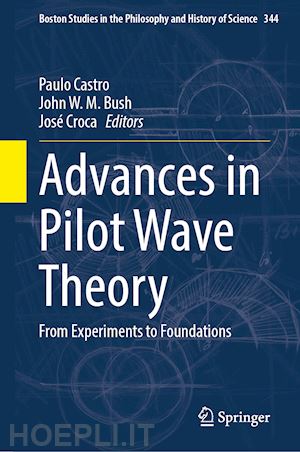
Questo prodotto usufruisce delle SPEDIZIONI GRATIS
selezionando l'opzione Corriere Veloce in fase di ordine.
Pagabile anche con Carta della cultura giovani e del merito, 18App Bonus Cultura e Carta del Docente
This book provides a state-of-the-art review of Pilot Wave Theory at the beginning of the XXI century. It contains the best contributions of the first International Conference on Advances in Pilot Wave Theory, held in Lisbon in 2021. The event brought together physicists from the new emerging field of Hydrodynamic Quantum Analogs (HQA) and philosophers of science. Three main themes were discussed: 1. Hydrodynamic quantum analogs, 2. Theoretical advances in pilot wave physics and, 3. Philosophical foundations of pilot wave theory. Recent experimental work in HQA has provided impetus to develop the pilot-wave approach into a realistic basis of quantum mechanics, specifically a dynamical completion of the existing theory of quantum statistics. To that end, the meeting featured theoretical work that advanced Louis de Broglie original pilot wave theory. This collection shows how several aspects of quantum systems have been reproduced in the hydrodynamic environment, and how the power of analogy suggests the possibility of a relatively intelligible quantum realm. Most notably, the notion of memory, as engendered in the pilot-wave-hydrodynamic system, suggests a profitable direction to explore in developing a more complete description of quantum phenomena. This book is expected to be of great interest to physicists, computer scientists and philosophers of science interested in the foundations of Quantum Mechanics.
Chapter 1 and Chapter 12 are available open access under a Creative Commons Attribution 4.0 International License via link.springer.com.
Chapter 1. Pilot-wave theory in the 21st Century (Paulo Castro, John Bush and J. R. Croca).- Chapter 2. The state of play in Hydrodynamic Quantum Analogs (John W. M. Bush, Valeri Frumkin and Konstantinos Papatryfonos).- Chapter 3. Establishing long-range pilot-wave interactions (André Nachbin).- Chapter 4. Hydrodynamically Inspired Pilot-Wave Theory: An Ensemble Interpretation (Yuval Dagan).- Chapter 5. On Multi-Time Correlations in Stochastic Mechanics (Maaneli Derakhshani and Guido Bacciagaluppi).- Chapter 6. A version of de Broglie’s double solution theory reproducing Landau’s quantization in a uniform magnetic field (Pierre Jamet and Aurélien Drezet).- Chapter 7. Convergence to quantum equilibrium: deterministic vs stochastic pilot wave dynamics (Mohamed Hatifi, Ralph Willox and Thomas Durt).- Chapter 8. Non-Quantum Behaviors of Configuration-Space Density Formulations of quantum mechanics (Philipp Roser and Matthew Scoggins).- Chapter 9. The Doubochinski pendulum – a paradigm for quantization through nonlinear interactions (Jonathan Tennenbaum).- Chapter 10. Completing the quantum ontology with the electromagnetic zero-point field (Luis de la Peña and Ana María Cetto).- Chapter 11. Are Hidden-Variable Theories for Pilot-Wave Systems Possible? (Louis Vervoort).- Chapter 12. The Wave-memory interpretation of Quantum Mechanics (Paulo Castro).- Chapter 13. What if We Lived in the Best of All Possible (Quantum) Worlds? (Valia Allori).- Chapter 14. How the history of thermodynamics informs the hidden variables debate in quantum mechanics (Adam Kay).- Chapter 15. Form, function, and continuity: knowledge on the move (Gildo Magalhães).- Chapter 16. John Bell's unpublished notes about de Broglie's Pilot Wave (Augusto Garuccio, Angela Laurora).- Chapter 17. The Quest for the Ontic Nature of the Quantum Waves (J.R. Croca).- Index.
Paulo Castro studied Physics at the Faculty of Sciences of the University of Lisbon and moved to the Humanities where he graduated in Anthropology at the University Nova de Lisboa in 1996. He holds a PhD in the philosophy of contemporary thought from the University Lusófona of Humanities and Technologies. In 2015 he joined the Philosophy of Natural Sciences Research Group, at the Centre for Philosophy of Sciences of the University of Lisbon, working on the philosophy of nonlinear Quantum Mechanics.
John W. M. Bush is a Professor of Applied Mathematics at MIT. He completed his BSc and MSc in Physics at the University of Toronto and his PhD in Geophysics at Harvard University, before pursuing postdoctoral research at the University of Cambridge’s DAMTP. He joined the faculty of MIT in 1998, was tenured in 2004 and now directs the Applied Mathematics Laboratory. His research began in geophysics, but then shifted towards surface-tension-driven phenomena and their applications in biology. For the past decade, his research has been focused on hydrodynamic quantum analogs.
José Croca directed the Research Group on the Foundations of Quantum Physics at the Centre for Philosophy of Sciences of the University of Lisbon. Held a teaching position at the Department of Physics of the University of Lisbon. Did his PhD in 1985 at the University of Lisbon under the supervision of J. Andrade e Silva, one of the most direct collaborators of Louis de Broglie. Did postgraduate research at the University of Bari with Professor Franco Selleri. He is the author of innumerous scientific books, papers and talks in international conferences about nonlinear causal quantum physics. He has proposed several experiments to detect quantum waves and introduced a non-linear Schrödinger equation and its wavelet-based set of generalized uncertainty relations, from which Heisenberg’s result as a particular case. Founding member of the Centre for Philosophy of Sciences of the University of Lisbon.











Il sito utilizza cookie ed altri strumenti di tracciamento che raccolgono informazioni dal dispositivo dell’utente. Oltre ai cookie tecnici ed analitici aggregati, strettamente necessari per il funzionamento di questo sito web, previo consenso dell’utente possono essere installati cookie di profilazione e marketing e cookie dei social media. Cliccando su “Accetto tutti i cookie” saranno attivate tutte le categorie di cookie. Per accettare solo deterninate categorie di cookie, cliccare invece su “Impostazioni cookie”. Chiudendo il banner o continuando a navigare saranno installati solo cookie tecnici. Per maggiori dettagli, consultare la Cookie Policy.